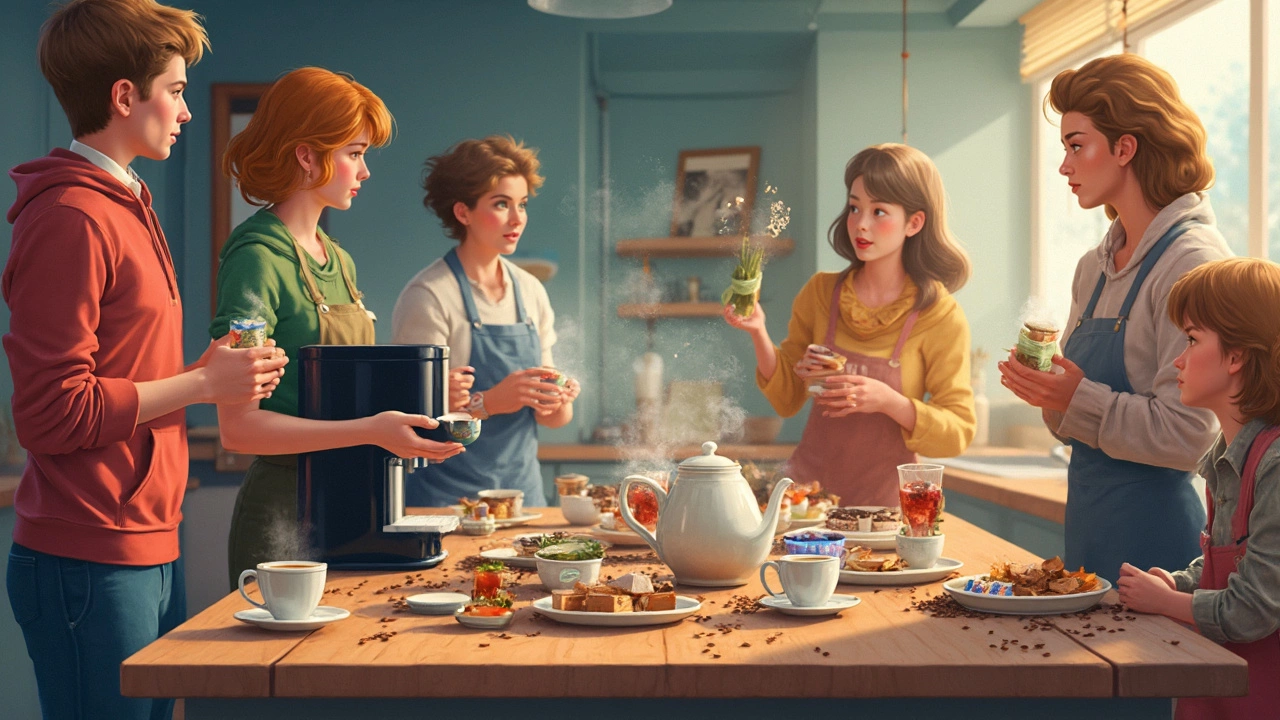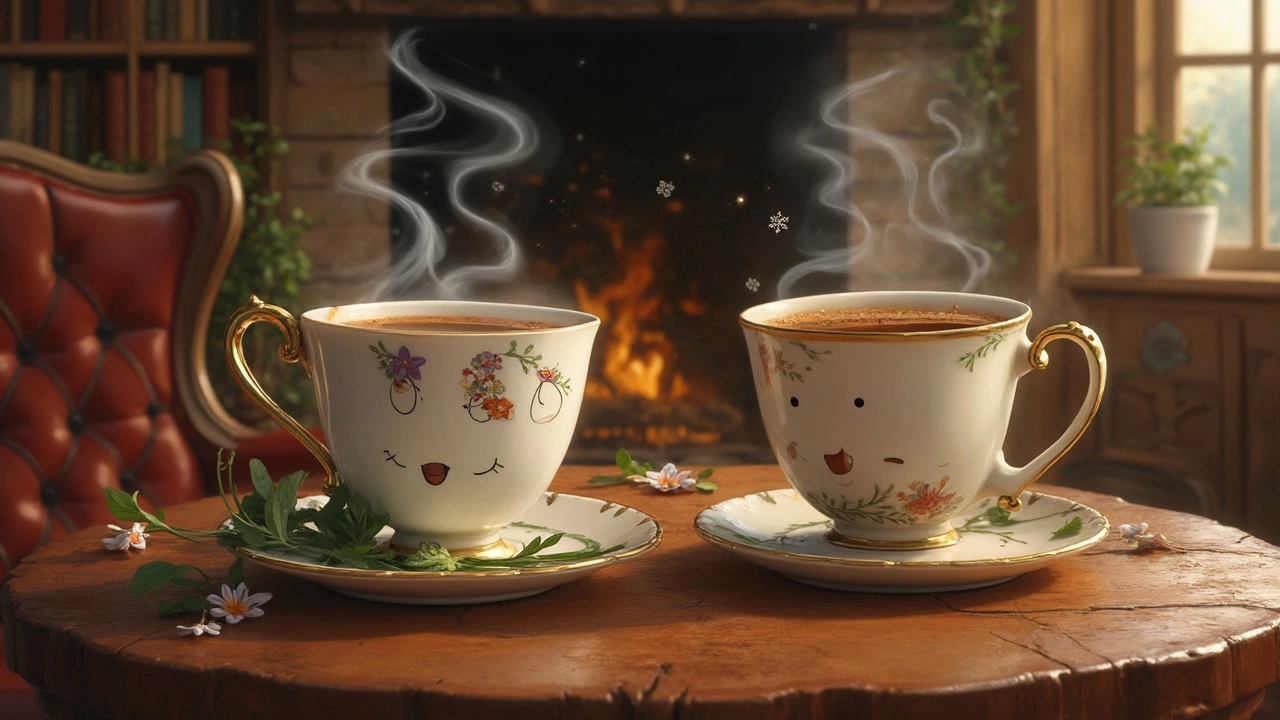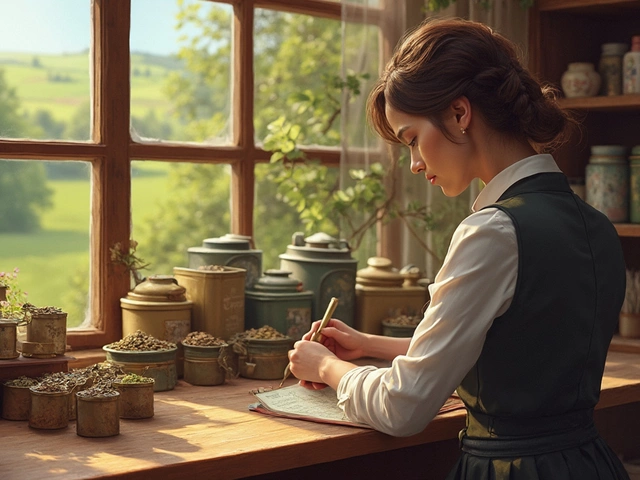Every morning, the caffeine showdown kicks off in kitchens around the world. The decision? A cup of steaming coffee or a soothing mug of tea. Can't really go wrong, right? But if you're curious why tea could be seen as coffee’s arch-nemesis, pour yourself a cup—whatever your preference—and let's get into it.
Coffee, known for that unmistakable wake-you-up zing, brings an energy boost like no other. You're probably nodding, thinking about that rich aroma swirling around your breakfast nook. Yet, tea, with its endless varieties and often subtle flavors, offers a completely different experience. Ever brewed a pots of jasmine or oolong? Then you know tea’s charm isn't just about a jolt; it's about the journey your tastebuds take.
- The Awakening Qualities of Coffee
- The Enchanting World of Tea
- Cultural Preferences and Health Benefits
- Tips for Tea Tasting
The Awakening Qualities of Coffee
When you hear the word coffee, you probably think 'energy.' That's no coincidence. Coffee has been the go-to morning brew that jolts our senses into action, thanks in large part to caffeine. What exactly is going on? Well, caffeine blocks adenosine, a brain chemical responsible for making us feel sleepy, giving us that fresh, wide-awake sensation.
Many even swear by coffee's power to sharpen focus and boost physical performance. It's often said, "coffee is the liquid fuel for the brain"—a sentiment echoed by John Hopkins Medicine, which noted,
“Caffeine is the most commonly used mood-altering drug in the world.”Trust us, no one is exaggerating when they say coffee keeps the wheels turning!
More Than Just a Pick-Me-Up
A great cup of coffee isn't just about the buzz, though. There’s a huge variety of roasts and brew methods that bring out unique flavors and aromas. Whether you're a fan of the robust earthy tones of a dark roast or the crisp brightness of a light roast, coffee caters to a wide range of palates.
And let's not overlook the role coffee plays in social settings. Think about those coffee shop gatherings or informal office chats over a pot of fresh brew. The social aspect of coffee can't be understated.
Surprising Perks
Beyond the taste and wake-up call, coffee might also have some health perks up its sleeve. Numerous studies have suggested moderate coffee consumption is linked to a lower risk of certain diseases like Parkinson's and Type 2 diabetes. Crazy, right?
| Common Benefits | Details |
|---|---|
| Improved Focus | Driven by caffeine's interaction with the brain |
| Boosted Metabolism | Helps with fat burning by increasing metabolic rate |
So, whether cradling a morning mug or navigating a busy afternoon, coffee remains a beloved staple in daily routines worldwide. More than just a drink, it's a lifestyle choice that fuels and flavors our lives in so many ways.
The Enchanting World of Tea
Tea isn't just a drink; it's an experience that stretches across cultures and history, far beyond just being the rival of coffee. Imagine stepping into a realm where a simple leaf can offer everything from comfort to luxury. With a variety of flavors and styles, tea deserves its moment in the spotlight.
The Spectrum of Flavors
Tea boasts a spectrum of flavors that can suit almost every mood or occasion. From the grassy freshness of green tea to the deep, smoky notes of lapsang souchong, there's a world to explore. Each type of tea undergoes different processing methods, turning the same plant, Camellia sinensis, into countless kinds of tea.
For those wondering where to start their tea journey, here's a quick guide:
- Black Tea: Known for its robust, full-bodied flavor. Think of English Breakfast or Earl Grey.
- Green Tea: Offers a lighter, more delicate taste. Sencha and Matcha are favorites here.
- Oolong Tea: A semi-oxidized option that falls somewhere between black and green in flavor.
- White Tea: The least processed, delivering a delicate, subtle flavor, like Silver Needle.
"Tea is an art that involves all the senses; it engages the mind and the soul," says renowned tea sommelier Jane Pettigrew.
Cultural Significance
Beyond flavors, tea holds deep cultural significance. In Japan, the tea ceremony, or 'chanoyu', is an intricate ritual that emphasizes harmony, respect, and tranquility. Meanwhile, in Britain, afternoon tea is a social event, complete with scones and finger sandwiches.
Why does tea capture such importance globally? Partly it’s because tea time often serves as a moment of pause, a chance to connect with oneself or with others.
Health Perks
In addition to its rich culture and taste, tea offers various health benefits. Green tea is often praised for its antioxidants, which are believed to help reduce inflammation and even improve heart health. In fact, a study from 2023 noted that regular green tea drinkers had a 20% lower risk of cardiovascular diseases compared to non-tea drinkers.
So next time you sip, know you're not just choosing a beverage; you're partaking in a worldwide tradition that brings both comfort and health in a teacup.

Cultural Preferences and Health Benefits
When it comes to cultural preferences, coffee and tea have their own loyal camps. In many Western countries, coffee often gets the spotlight—a staple at breakfast and even seen as a social connector during meeting breaks. Coffee's bold flavor makes it a favorite, especially in the U.S. and parts of Europe. But across the globe, tea reigns supreme.
In countries like China, Japan, and India, tea isn't just a beverage; it's part of the lifestyle. Did you know China's 'tea ceremonies' are as much about mindfulness as they are about sipping? The whole process is an art form, emphasizing harmony and respect. Japan takes it a step further with its own 'Chanoyu'—a ceremony devoted to the preparation and consumption of matcha tea.
"Tea is to the body as music is to the soul," said Chinese philosopher and poet Lu Yu, which shows just how vital tea is in certain cultures.
Switching gears to health benefits, both drinks have their perks. Coffee, with its famous caffeine boost, is known to improve physical performance and concentration. Studies show it can even lower the risk of diseases like Parkinson's.
Tea, on the other hand, can contribute to a longer life, thanks to its wealth of antioxidants. Green and black teas can reduce heart disease risk factors. Plus, herbal teas like chamomile help with digestion and provide a calm, relaxing effect—an excellent choice before bed.
Coffee vs. Tea: Health Benefits
| Beverage | Benefit |
|---|---|
| Coffee | Improves focus, lowers disease risk |
| Tea | Rich in antioxidants, aids relaxation |
All things considered, the decision between coffee and tea boils down to personal preference and what you’re looking for—whether it’s an energy boost or a chase for calm vibes. So next time you're in the kitchen, consider your mood and choose accordingly. Each has its place in daily life!
Tips for Tea Tasting
Feeling adventurous in the world of tea? Let's dive into some cool tips that'll have you tasting like a pro in no time.
Start with the Basics
Before you go all in with exotic flavors, get a handle on the classic categories: green, black, oolong, white, and herbal. Each has its own unique time, flavor, and aroma profile.
Use Fresh, Quality Leaves
Freshness counts! Old, stale tea won't give you much to work with. Invest in quality loose leaf varieties if you can. Not only does it often taste better, but it can also be brewed multiple times, revealing different notes with each steep.
- Green tea: Crisp and grassy. Steep at low temperatures to avoid bitterness.
- Black tea: Robust and full-bodied. Best brewed hot and sometimes paired with milk or sugar.
- Oolong: A delightful mix of green and black qualities. Goes well with light snacks.
- White tea: Delicate and subtle. Requires gentle handling to preserve flavors.
Mind Your Water Temperature
Water temperature can make or break your tea. For example, boiling water can scorch green or white varieties, leading to a bitter taste. Here’s a simple guide:
- White tea: 160-185°F (71-85°C)
- Green tea: 160-185°F (71-85°C)
- Oolong tea: 180-200°F (82-93°C)
- Black tea: 200-212°F (93-100°C)
Take Your Time
Tea tasting is meant to be a slow, mindful experience. Savor each sip, notice the aroma, and let the flavors unfold gradually on your palate.
Experiment with Pairings
Once you're confident with tasting alone, try pairing tea with food. Cheese, chocolate, or even spicy dishes can highlight or contrast different flavor notes.
If you're really geeky about this, you might want to track your experiences. Keeping a simple journal or notes will help you remember what works and what doesn't, refining your coffee alternatives exploration.


